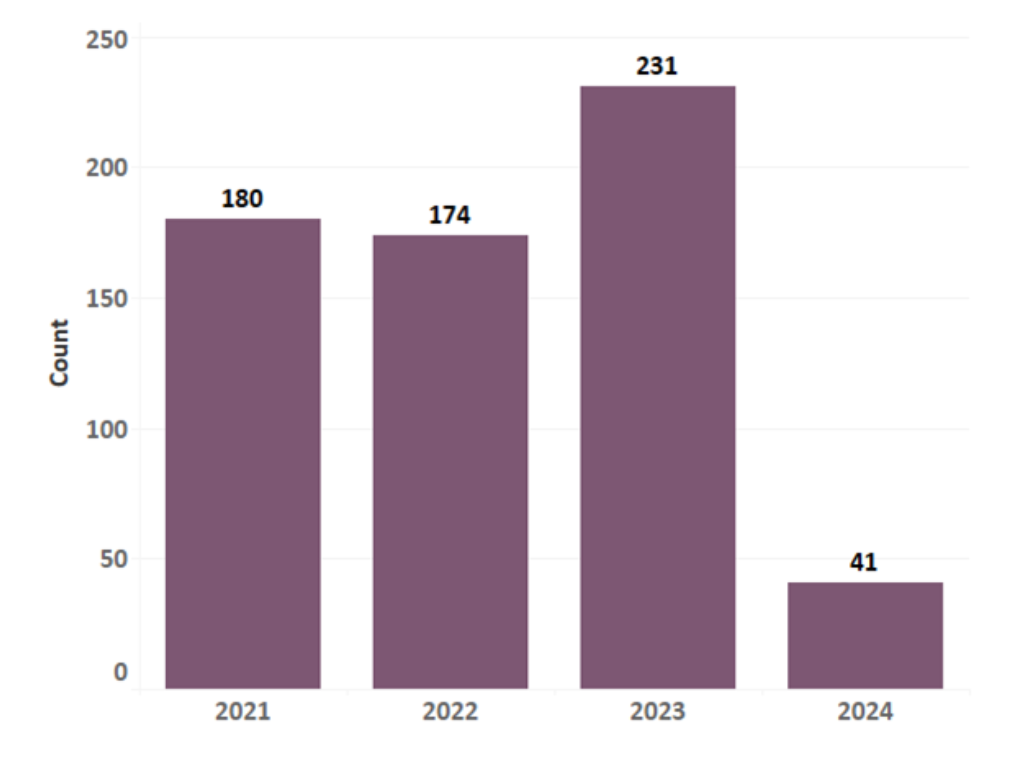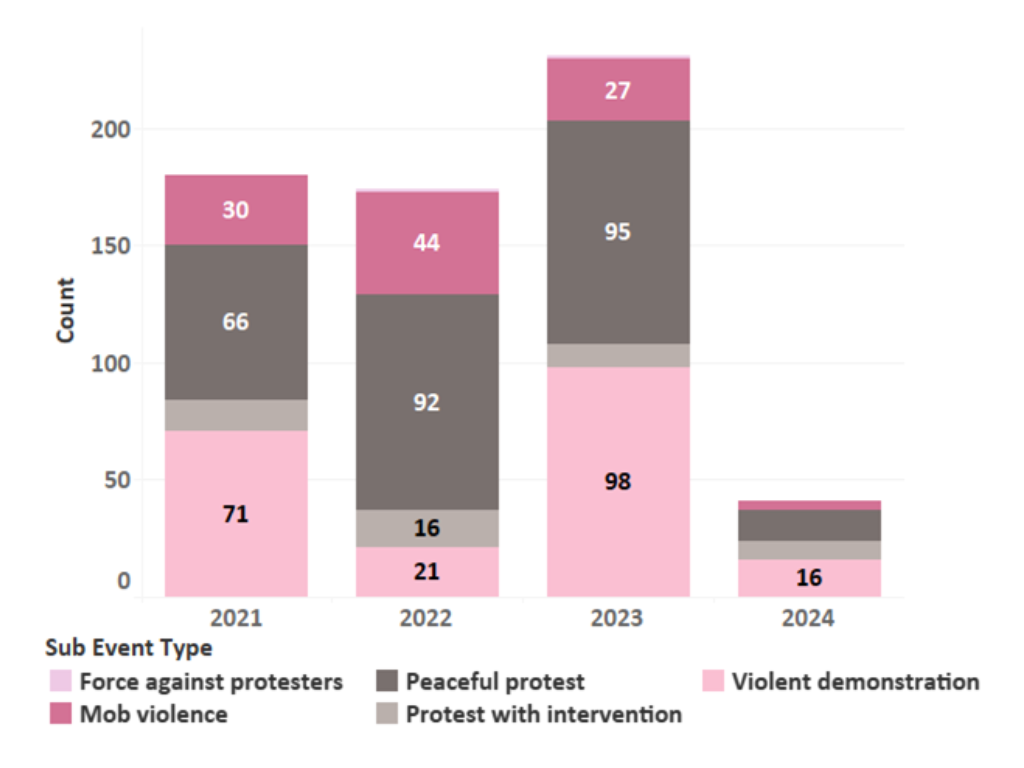Tensions relating to the 2024 presidential elections in Senegal have led to heightened levels of civil unrest in the country in the past year, including violent protests and clashes with security forces across the country. Reports from Amnesty International show that at least 56 people have died during protests in Senegal between March 2021 and August 2023, highlighting the severity of violent unrest. Protests have largely been fueled by concerns among the political opposition that President Macky Sall intends run for a third term, coupled with accusations of a crackdown on opposition candidates, activists and the freedom of expression.
Background
In 2021, speculation about President Sall running for a third term in the now-delayed February 2024 elections led to the first round of protests in Senegal. The early signs of a possible third term became apparent when Sall was re-elected in 2019 for a five-year term after a constitutional amendment established a two-term limit for presidents. His supporters advocated for his re-election, arguing that his initial term under the previous constitution should not be considered. Sall had remained ambiguous about his ambitions for a third term, further stoking tensions. This stance sparked opposition and protests, particularly from the F24 movement, which was formed to oppose Sall’s potential third term. The F24, consisting of over 100 organisations, includes key opposition figures such as Ousmane Sonko and former Dakar mayor Khalifa Sall, held demonstrations demanding an end to Sall’s term before the elections, among other political demands including the release of political detainees, electoral code amendments, and transparent elections.
In June 2023, over 16 people died in Dakar during a series of protests relating to the arrest and conviction of Ousmane Sonko over charges of “corrupting the youth”. On 03 July 2023, President Sall announced that he would not seek a third term in the country’s February 2024 presidential election, declaring his current tenure as his final term. Despite his announcement, demonstrations relating to the prosecution of Sonko continued in Dakar. By August 2023, protests had extended beyond Dakar and Ziguinchor to Kolda in the Kolda Region and Pikine in the Dakar Region. On 01 August 2023, at least two people were killed and five wounded by a petrol bomb during a protest in the Yarakh area of Dakar, worsening the threat level associated with violent protests. The incident, which was designated as a terrorist attack by the interior ministry, came a day after Sonko’s Patriots of Senegal (PASTEF) party was dissolved by the government. On 01 November 2023, the Supreme Court of Senegal effectively barred Sonko from running in the 2024 elections.

Opposition candidates organise against Sall
On 20 January 2024, a group of over 40 candidates, led by former prime minister Aminata Toure, raised concerns about irregularities in the verification process for the presidential election. Toure had approached the European Union (EU) election observer mission on 15 January, alleging that these irregularities were part of the Sall administration’s efforts to favour the ruling Benno Bokk Yakaar (BBY) coalition and its candidate, Prime Minister Amadou Ba. The exclusion of opposition leader Ousmane Sonko from the list has strengthened his supporters’ belief that he is being unfairly targeted by President Sall. International NGOs, such as Human Rights Watch, have supported these claims, stating that the Sall administration has been cracking down on the opposition, media, and civil society ahead of the elections. Human Rights Watch had previously denounced the government’s dissolution of Sonko’s PASTEF party in July 2023 and the arrest of journalists, activists, and government critics over the past two years.
Sall announces election postponement
On 03 February, President Sall announced that the forthcoming presidential election on 25 February would be postponed. Sall’s announcement was made hours before campaigning was set to begin for the election, citing what he referred to as “murky conditions [that] could seriously harm the credibility of the election”. Sall was referring to a commission of inquiry which was looking into allegations by opposition candidate Karim Wade of corruption, conflicts of interest, and technical irregularities in the candidate registration process. The announcement was met with violent demonstrations in Dakar where over three people were killed, and clashes with security forces were recorded. The violent unrest also led to the temporary detention of presidential candidate Anta Babacar Ngom and former prime minister Aminata Toure. The former ruling Senegalese Democratic Party (PDS) party’s offices were reportedly vandalised in Saint-Louis, and internet services were cut. The PDS party office was likely targeted after showing support for the election postponement, citing a lack of transparency. A new political movement named Aar Sunu Election (Let’s Protect Our Election) also surfaced in response to the postponement, joining opposition figures in the protests.
Election postponement overruled
On 15 February, the Constitutional Council of Senegal ruled that President Sall’s decision to postpone the presidential election was unconstitutional, stating that only the apex judicial body has the authority to postpone an election, not the president. The council also declared the extension of Sall’s mandate beyond 02 April as unconstitutional. As a result, the council revoked both the presidential decree postponing the election and the National Assembly’s bill specifying the new election date. The Constitutional Council urged authorities to select a new date as soon as possible, acknowledging that holding the election on 25 February was no longer feasible. Following the ruling of the court, President Sall reiterated during an address on 22 February that he has no intention to run for a third term, stating that he will step down on 02 April.

Consequences for ECOWAS
Sonko had appealed to the Economic Community of West African States (ECOWAS) to contest both the dissolution of his party and the striking of his voter registration in 2023. However, his case was dismissed by the regional court, which concluded that none of his rights were violated. Following the postponement of the elections by Macky Sall however, ECOWAS expressed concern and urged authorities to set a new date promptly. The weak response of the regional bloc to what critics consider to be a ‘constitutional coup’ is likely to further undermine the legitimacy and cohesion of the organisation, whose relations are strained with other member states, particularly Niger, Mali and Burkina Faso. Concerns about the trend of a democratic decline within ECOWAS are also likely to be further amplified as the political crisis in Senegal deepens.
Outlook
Economic ramifications
Past protests related to the upcoming elections have resulted in significant rioting and looting, particularly affecting businesses in Dakar and Ziguinchor regions. In June 2023, the Dem Dikk bus company reported losses of USD 5.75 million due to attacks on its vehicles and operational restrictions. The government also estimates that a single day of protests can reduce economic output by approximately USD 33 million. Following Sall’s announcement to postpone the elections, markets reflected a negative response, with Senegal’s Eurobonds dropping sharply. The International Monetary Fund (IMF) projects an 8.8 per cent Gross Domestic Product (GDP) growth for 2024, partly driven by the anticipated start of production in the emerging oil and gas sector. However, the political uncertainty is likely to affect the commencement of production in the country’s two main oil fields, which were scheduled to begin by the second half of the year. This uncertainty is also likely to affect investor confidence in other key sectors including mining, where investors may adopt a more cautious approach. If concerns about the legitimacy of the Sall administration escalate, the IMF may suspend financing for the government, impacting its ability to meet external financing needs and potentially increasing domestic and regional borrowing.
Continued civil unrest
On Friday 23 February, 16 out of the 19 opposition candidates declined an invitation to participate in discussions that President Sall insists are crucial before setting a new date for the postponed presidential election. The rejection of talks indicates that the ruling by the Constitutional Council has strengthened the resolve of opposition and civic groups that have strongly opposed the postponement of the election. These groups include the Yewwi Askan Wi (YAW) opposition bloc, Sonko’s PASTEF party, and the majority of presidential candidates. President Sall’s continued push for talks is perceived by the opposition as a way to gain time and find other ways to remain in power, rather than to step down. Opposition candidates likely see President Sall’s vague references to conflicts of interests in the electoral process as a ruse for his attempted term limit extension, especially since the dialogue process has no clearly defined timeline. Extending dialogue to address the the ruling of the Constitutional Court provides a legal basis for the removal of Sall by relevant authorities, as well as ECOWAS, should he pursue a third term in other ways.
Tactical and operational implications
Given that talks between President Sall and the opposition have failed to take place, a new wave of protests demanding that he steps down are highly likely in the coming weeks. In Dakar, precedent suggests that flashpoints include the Place de la Independence, the VDN motorway, the Cheikh Anta Diop University (UCAD), and the Cite Keur Gorgui neighbourhood. Given security forces’ frequent use of heavy-handed crowd control measures during previous protests, there is a high probability that demonstrations will be accompanied by clashes between police and protesters. There is also an increased risk of looting targeting both public and private assets, such as petrol stations, supermarkets, and government buildings. French businesses are especially vulnerable given the high levels of anti-French sentiment among the opposition. Any such outbreaks of unrest will also see the Senegalese state continue to employ movement and communication restrictions as a means of limiting public participation in anti-government mobilisation. Such measures could have an acute impact on travel, business and public services.

Castor Vali Support
To support our clients in tracking, forecasting, and mitigating the above risks, Castor Vali has developed a variety of tools, including intelligence subscription packages and in-house training.
To read more about our products and services see our Africa Security Information Service.
We also encourage our clients to test our services and offer free trials to interested clients at any time. Please complete the form below to access these reports:
Security Information Service Trial
Clients interested in trailing our subscription packages should complete this form:


